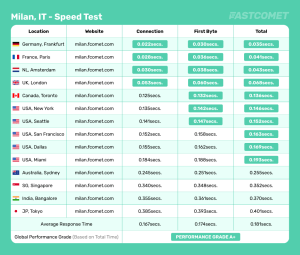
With Black Friday and Cyber Monday just around the corner there is no better time to dive into their history, and examine the changes they spurred online. Anyone who was alive and remembers what those days were decades ago (especially Black Friday) can attest to how much they have changed over the years. For one, the brawls are no longer in the retail stores but online with people hammering their F5 key while waiting for the sales to begin. Not only that, they have also inspired whole businesses to adopt different strategies for just that one weekend of the year. The main business we want to focus on in this blog post is web hosting.
There is no doubt that Black Friday and Cyber Monday are no longer exclusive to the physical space. In fact, the opposite is very much true, as almost 20% of shopping was done online last year. Such a rise in online shopping has affected how web host providers conduct their business. On the one hand they offer sales themselves, while on the other hand some even offer packages optimized for online stores. As we are primarily a web hosting company, we will examine the effect Black Friday and Cyber Monday have had on online sales and, therefore, on web hosting altogether.
Where They Started
Black Friday first became a thing in the 1980s and we explained its history in our previous blog post for the month, so please take a look at it to learn more. Meanwhile, Cyber Monday began in the USA in 2005. It was first recognised as a holiday by the National Retail Federation after they noticed that customers would continue shopping on the Monday after Thanksgiving, while working. Back then fast home internet was not as widespread as it is nowadays. Offices or internet cafes were where you would typically find internet fast enough to accommodate comfortable shopping. Since most people work on the Monday after Thanksgiving, they would use the fast internet connection at their office to continue their shopping. The end of November is a hectic time for people all around the world who celebrate Christmas, as that is usually when the shopping season begins.
With the two days so close together, retailers and online stores will often bunch them together and have one big sale throughout the weekend and Monday (some even do weeks’ worth of sales). Both have grown in popularity to the point that they are a worldwide phenomena, and no longer confined to just the US. Since the world became much smaller and much more interconnected with the advent of fast internet connection, these two holidays spread like wildfire. Nowadays, almost every country around the world recognises them one way or another.
Where They Are Now
It has been almost half a century since Black Friday was recognised, and 18 years for Cyber Monday: a lot of time has passed and the holidays have evolved beyond what they started out as. Black Friday used to be a brick-and-mortar holiday, while Cyber Monday involved online sales. Now they are both intermingled and you will find Cyber Monday sales in physical stores, and Black Friday discounts online. The two days have formed more or less a holiday of their own.
In recent times they have become even more popular with the rise of online shopping in general. Everyone has access to fast internet now, and there are countless websites you can buy things from. Whether it is on Black Friday or Cyber Monday, websites will usually keep their sales going throughout the weekend, and sometimes even throughout the week after it. The two days offer great opportunities not just for customers, but for stores as well. They can sell their overflowing stock that was purchased at low prices, for low prices, and still turn in a profit because of the sheer amount of sales. Remember, retailers don’t pay as much as we do when buying their stock. They typically buy directly from distributors or manufacturers, typically in bulk, which comes with the benefit of lower prices.
Black Friday and Cyber Monday are the perfect opportunities to empty those full stockrooms. Whether it is online or in person, retailers will slash their prices to ridiculous amounts, making one wonder how they are even turning a profit. Don’t worry, it is a carefully calculated risk that more often than not is justified. So, whether you go to a brick-and-mortar store or an online one, expect some exciting deals during those two days, and even the weekend between them.
Their Impact on Web Hosting
Due to their popularity, Black Friday and Cyber Monday have affected a lot of industries and markets just by virtue of their existence. Both online and offline, companies had to adapt to accommodate those two days, and the unique challenges they offer each year. Not for nothing, though, as the benefits everyone involved with them – from production, to distribution, and sales – are worth it. It is not just about the revenue, since those two days can bring in more than just money. They can bring in loyal, returning customers, and companies love those. It is much easier to retain a customer, than try to attract a new one.
So, industries and markets adapted, changed, and embraced Black Friday, Cyber Monday, and online shopping altogether. How did that affect the web hosting market, though? That is what we are here to discuss, as it is a fascinating evolution. In no particular order, here are three major aspects of web hosting that online shopping has affected.
Sales and Discounts
At some point web hosts caught on that they can also celebrate Black Friday and Cyber Monday with huge discounts of their own. If an offline store could do it, why not them as well? The huge upside to this was that in the online world, clicks, views and impressions in general matter immensely. It is all connected to SEO and that topic is far too broad for us to discuss in this blog, but the gist of it is this: sales attract more customers than usual. More customers means more impressions, and therefore higher organic traffic for the web host’s website. Finally, more traffic means better search engine rankings.
Of course, web hosting has had sales and discounts since its existence, so Black Friday and Cyber Monday were not the spark that was necessary to remind companies they can offer sweet deals. It was just another couple of days they could take advantage of.
Better Service
An online store is a specialized type of website that has a lot of moving parts under the hood. You have the actual website with its content, but then you also have a payment portal, email confirmations, notifications, user databases with all of their purchases and rewards, and so on. All those things require different resources: disk space, bandwidth, email service, database space, etc.
Since online stores are a complex clockwork, the hosting they use has to be on point, too. That is how online shopping helped evolve web hosting: it prompted providers to start offering more with their hosting packages, both in terms of raw resources and number of services.
Customers will always want as good as they can get for their websites, for a reasonable price. What better way to entice them, in this case, with a package which doesn’t just host their website’s files, but also has a generous bandwidth quota and disk space? And what about a free email service, or resource monitoring? Not just that, but online shopping helped push hosting towards implementing even more security measures. Stores work with user information, so the last thing a host would want is for that user information (name, email, address, card information) to leak due to a security breach.
Of course, online shopping is not the sole reason web hosting has evolved from what it was ten years ago. Nonetheless, it did most certainly help steer it in the right direction: towards improvement.
Specialized Hosting
Online shopping also inspired the creation of hosting plans tailored for e-commerce websites. While, yes, a general hosting plan can offer the basic needs an online store might offer, a properly specialized hosting plan is way better.
Like with everything in life, devoting all your attention, time and resources to one specific thing rather than to a multitude of things, will produce more precise results. That is why hosting plans dedicated to accommodating online stores will be more feature-rich. Such a dedicated host will, in general, have the tools necessary to build your online store, manage, and support it. Their support staff will likely be far more knowledgeable on the topic as those people are the first line of defense when it comes to resolving any and all issues.
As an example, dedicated e-commerce hosts may have tools and integrations that can directly connect with your website to help track various statistics. Sales, items of interest, payment history, and so on. They might even have a website builder of their own with the sole purpose of launching an online store with ease, without having to set up all of its components on your own (like how it is with WordPress and WooCommerce, for instance).
You can see for yourself how such a development helped transform hosting in a wholly different direction: it is a new branch of hosting that didn’t exist before.
Increase in Popularity
By far the most important way online shopping transformed web hosting is it made it more popular than it already was. People started to realize that their offline stores could also be online. That will open them up to not just their local community, but to the whole world. But, in order to get a website going you need to host it somewhere, so it led to the transformation of web hosting once more: not in a software or hardware sense, but in sheer number of users.
It wasn’t a sudden process, when people started putting their stores online: like evolution itself, it was a gradual process, but a clearly definable one. More and more people got online to promote their goods, so web hosts got more and more customers. They had to adapt to accommodate those customers’ needs for resources and features that would support their online shops, which led to an increase in service quality.
It is all connected, as you can see, and online shopping has done great for the longevity of web hosting. Yes, it does bring in money, but it is also one of the reasons why hosting providers try to improve their services. Web stores are complicated things, and hosts evolve to retain their owners as clients. It is a symbiotic relationship that will likely continue to evolve as e-commerce keeps gaining popularity.
Final Thoughts
Online shopping and web hosting have always gone hand-in-hand. You can’t have an online store without a web host to support it, and you can’t have a web host without customers. Online stores are growing in numbers and popularity by the day, and we wouldn’t be surprised if they surpass 30% of overall shopping made in the near future. Until then, we will be happy to host any and all stores and continue improving our services alongside them.


